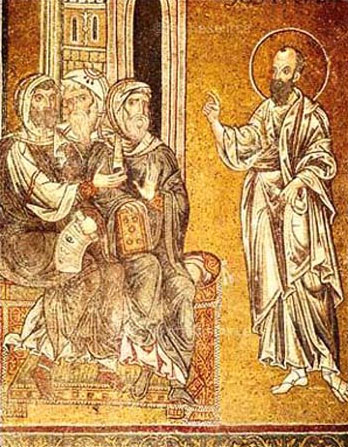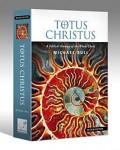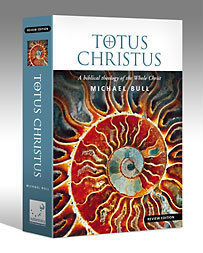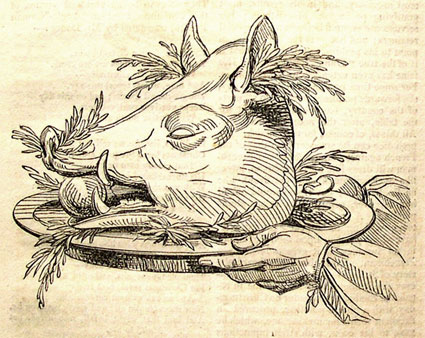May
26
2010

“Moreover, brethren, I do not want you to be unaware that all our fathers were under the cloud, all passed through the sea, all were baptized into Moses in the cloud and in the sea…” (1 Corinthians 10:1-2)
All Israel was baptized through the sea, including the infants. But Christians who practice infant baptism confuse the corporate picture with the personal.
Continue reading
12 comments | tags: Acts, Baptism, Circumcision, Isaiah | posted in Biblical Theology
Dec
9
2009
Jesus built a new Tabernacle before He tore down the old one that was ready to pass away. This is the basis of His message to John in prison:
Continue reading
Comments Off | tags: Acts, Bible Matrix, Jericho, John the Baptist, Kelby Carlson, Paul, Tabernacle, Trumpets | posted in Biblical Theology, The Last Days
Aug
1
2009

Or Rich Jewish Rulers made Poor, Blind and Naked
Or The Bible Teaches Replacement Theology
According to James Jordan, there’s nothing much in Revelation that isn’t also elsewhere in the New Testament. We just don’t get Revelation because we don’t speak the language of the Old Testament with any confidence. Accordingly, his interpretation of the Apocalypse interprets the seven Seals as the release of the gospel. The Trumpets are the warnings of the Apostles to the Jews until the beginning of the Roman siege. [1]
Continue reading
Comments Off | tags: Acts, Dominion Theology, James Jordan, Passover, Paul, Replacement Theology, Revelation | posted in Biblical Theology, The Last Days, Totus Christus
Apr
19
2009
or The Feasts are the Key to the Revelation
All Christians recognise Christ’s fulfilment of Passover (crucifixion) and Firstfruits (ascension), followed by Pentecost. Futurists, who major on all things Jewish, recognise that Trumpets and Atonement follow, but they push them into the future.
Continue reading
Comments Off | tags: Acts, AD70, Against Hyperpreterism, Atonement, Dispensationalism, Herod, Holy war, Jezebel, Passover, Totus Christus, Trumpets | posted in Against Hyperpreterism, Biblical Theology, The Last Days
Apr
15
2009
Passover versus Atonement = Circumcision versus Baptism
With that background, the entire Bible follows this pattern:
Sabbath - Creation to Abraham
000Passover - Circumcision divides humanity in two
>000000Firstfruits - Under Moses, a priesthood ascends before God,
>000000and draws near over blood sacrifices
000000000Pentecost - In the biblical pattern, this central point is always
000000000testing in the wilderness. This is the life of Christ,
000000000who is tested in the way all men are, but who does not sin
000000Trumpets - Christ assembles the New Covenant church,
000000making out of Jew and Gentile one new man in the first century
000Atonement - A corrupted Judaism is destroyed as Jericho, vindicating
000the words of Christ. This is the first conquest of the age
000in which we now live
Booths - the final coming of Christ and the judgment, after which the saints live with Him in glory
Now, to get to the point…
Continue reading
2 comments | tags: Acts, Baptism, Chiasm, Feasts, Jericho | posted in Biblical Theology
Apr
15
2009

The one who conquers and who keeps my works until the end, to him I will give authority over the nations, and he will rule them with a rod of iron, as when earthen pots are broken in pieces, even as I myself have received authority from my Father.
Christ refers here to Psalm 2. It had been fulfilled in the “head” at His ascension. At this point, it was yet to be fulfilled in the “body.”
Continue reading
Comments Off | tags: Acts, Angels, Ascension, Peter Leithart, Psalm 2, Sodom, Totus Christus, Two witnesses | posted in Biblical Theology, Totus Christus
Apr
10
2009
 “And now, indeed, the hand of the Lord is upon you, and you shall be blind, not seeing the sun for a time.” And immediately a dark mist fell on him, and he went around seeking someone to lead him by the hand.” Acts 13:11
“And now, indeed, the hand of the Lord is upon you, and you shall be blind, not seeing the sun for a time.” And immediately a dark mist fell on him, and he went around seeking someone to lead him by the hand.” Acts 13:11
The blindness of Elymas caused Sergius Paulus to believe. The temporary blindness of a Jew brought about the conversion of a Gentile.
A repeated symbolic concept in Scripture is that of sight and blindness. Samson and King Zedekiah both lost their eyes. Isaac and Eli were blind. From Genesis 1:4, 3:6 and 6:2 we learn that eyes are organs of discernment and judgment. The process of maturity makes wise judges who are “the eyes of the Lord”, walking “to and fro on the earth”, collecting evidence to present before His court. Bible symbols are consistent, and their meanings become plain to the saints with their “new eyes.” Those who refused to obey the gospel twisted the Scriptures to their own destruction (2 Peter 3:16).
“For I do not desire, brethren, that you should be ignorant of this mystery, lest you should be wise in your own opinion, that blindness [hardness] in part has happened to Israel until the fullness of the Gentiles has come in.” Romans 11:25
…Herod and the Jews had symbolically become Egypt, hardened like Pharaoh (Romans 9:17-18; Hebrews 3:16; 8:9; 11:26-29; Jude 1:5; Revelation 11:8). The old Jerusalem was Hagar, and the New Jerusalem was Sarah. Christians, not Jews, were “the promised child.” Judaism had become childless like Naomi, and it was only the “fullness” of outsiders, Peter’s “unclean animals”—Ruth—that rescued the people of God from spiritual famine, the extinction of unbelief. The barrenness of Egypt was replaced with the harvest of Pentecost.
…Agabus the prophet foretold a famine in Judea (the curse for the shedding of Stephen’s innocent blood), but the Antioch saints sent relief (the richness of ‘Ruth’) to those in Judea.
Comments Off | tags: Acts, Isaac, Paul, Ruth, Samson, Typology, Zedekiah | posted in Biblical Theology, The Last Days, Totus Christus
Apr
10
2009
 “I know your works: you are neither cold nor hot. Would that you were either cold or hot!
“I know your works: you are neither cold nor hot. Would that you were either cold or hot!
So, because you are lukewarm, and neither hot nor cold, I will spit you out of my mouth.” (Revelation 3:15-16)
In the book of Revelation, many sentences contain multiple Old Testament allusions knotted together. Sometimes these are more obvious (the Judaisers as Babylonian locusts from Joel with long hair added to make them ‘bad Nazirites’, for example), but sometimes they only become apparent from their position within the structure of the passage in question.
Continue reading
Comments Off | tags: Acts, Feasts, James Jordan, Joel, Nazirite, Revelation, Solomon, Tabernacle | posted in Biblical Theology, The Last Days






























